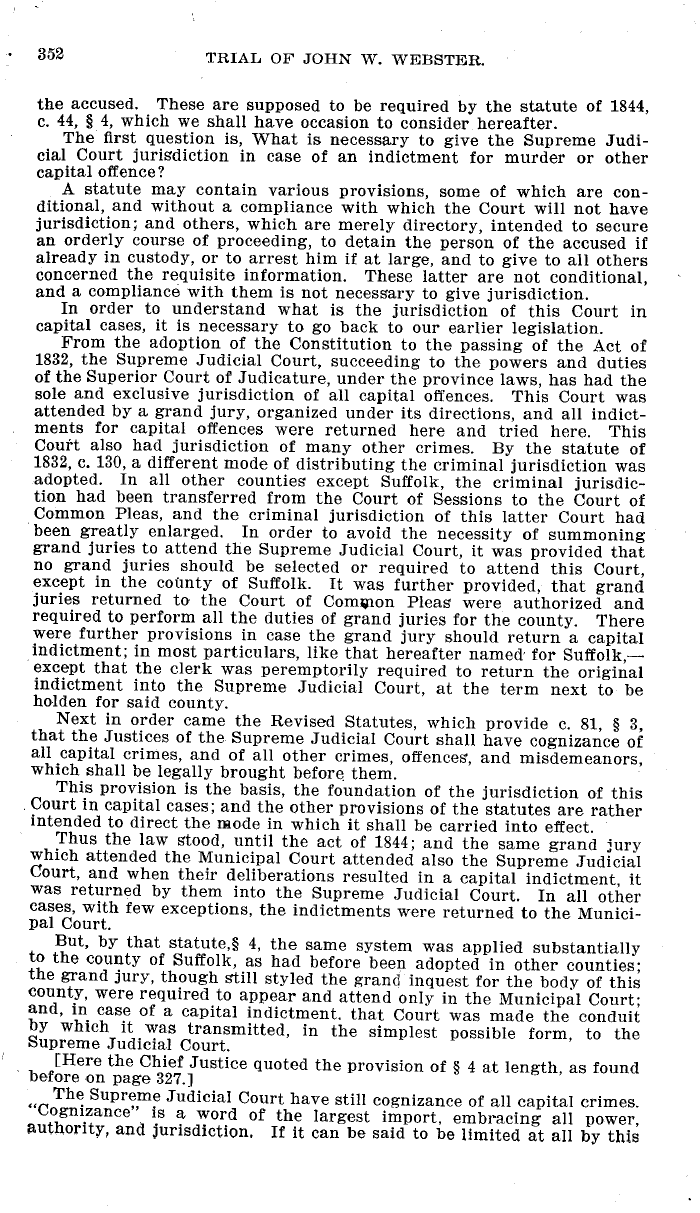|
352 TRIAL OF JOHN W. WEESTER.
the accused. These are supposed to be required by the statute of 1844,
c. 44, § 4, which we shall have occasion to consider hereafter.
The first question is, What is necessary to give the Supreme Judi-
cial Court jurisdiction in case of an indictment for murder or other
capital offence?
A statute may contain various provisions, some of which are con-
ditional, and without a compliance with which the Court will not have
jurisdiction; and others, which are merely directory, intended to secure
an orderly course of proceeding, to detain the person of the accused if
already in custody, or to arrest him if at large, and to give to all others
concerned the requisite information. These latter are not conditional,
and a compliance with them is not necessary to give jurisdiction.
In order to understand what is the jurisdiction of this Court in
capital cases, it is necessary to go back to our earlier legislation.
From the adoption of the Constitution to the passing of the Act of
1832, the Supreme Judicial Court, succeeding to the powers and duties
of the Superior Court of Judicature, under the province laws, has had the
sole and exclusive jurisdiction of all capital offences. This Court was
attended by a grand jury, organized under its directions, and all indict-
ments for capital offences were returned here and tried here. This
Court also had jurisdiction of many other crimes. By the statute of
1832, c. 130, a different mode of distributing the criminal jurisdiction was
adopted. In all other counties except Suffolk, the criminal jurisdic-
tion had been transferred from the Court of Sessions to the Court of
Common Pleas, and the criminal jurisdiction of this latter Court had
been greatly enlarged. In order to avoid the necessity of summoning
grand juries to attend the Supreme Judicial Court, it was provided that
no grand juries should be selected or required to attend this Court,
except in the county of Suffolk. It was further provided, that grand
juries returned to the Court of Comgion Pleas were authorized and
required to perform all the duties of grand juries for the county. There
were further provisions in case the grand jury should return a capital
indictment in most particulars, like that hereafter named for Suffolk,-
except that the clerk was peremptorily required to return the original
indictment into the Supreme Judicial Court, at the term next to be
holden for said county.
Next in order came the Revised Statutes, which provide c. 81, § 3
that the Justices of the Supreme Judicial Court shall have cognizance of
all capital crimes, and of all other crimes, offences, and misdemeanors,
which shall be legally brought before them.
This provision is the basis, the foundation of the jurisdiction of this
Court in capital cases; and the other provisions of the statutes are rather
intended to direct the mode in which it shall be carried into effect.
Thus the law stood, until the act of 1844 and the same grand jury
which attended the Municipal Court attended also the Supreme Judicial
Court, and when their deliberations resulted in a capital indictment it
was returned by them into the Supreme Judicial Court. In all other
cases, with few exceptions, the indictments were returned to the Munici-
pal Court.
But, by that statute ,§ 4, the same system was applied substantially
to the county of Suffolk as had before been adopted in other counties;
the grand jury, though still styled the grand inquest for the body of this
county, were required to appear and attend only in the Municipal Court;
and, in case of a capital indictment. that Court was made the conduit
by which it was transmitted, in the simplest possible form, to the
Supreme Judicial Court.
[Here the Chief Justice quoted the provision of § 4 at length, as found
before on page 327.]
The Supreme Judicial Court have still cognizance of all capital crimes.
"Cognizance" is a word of the largest import, embracing all power,
authority, and jurisdiction, If it can be said to be limited at all by this
|

